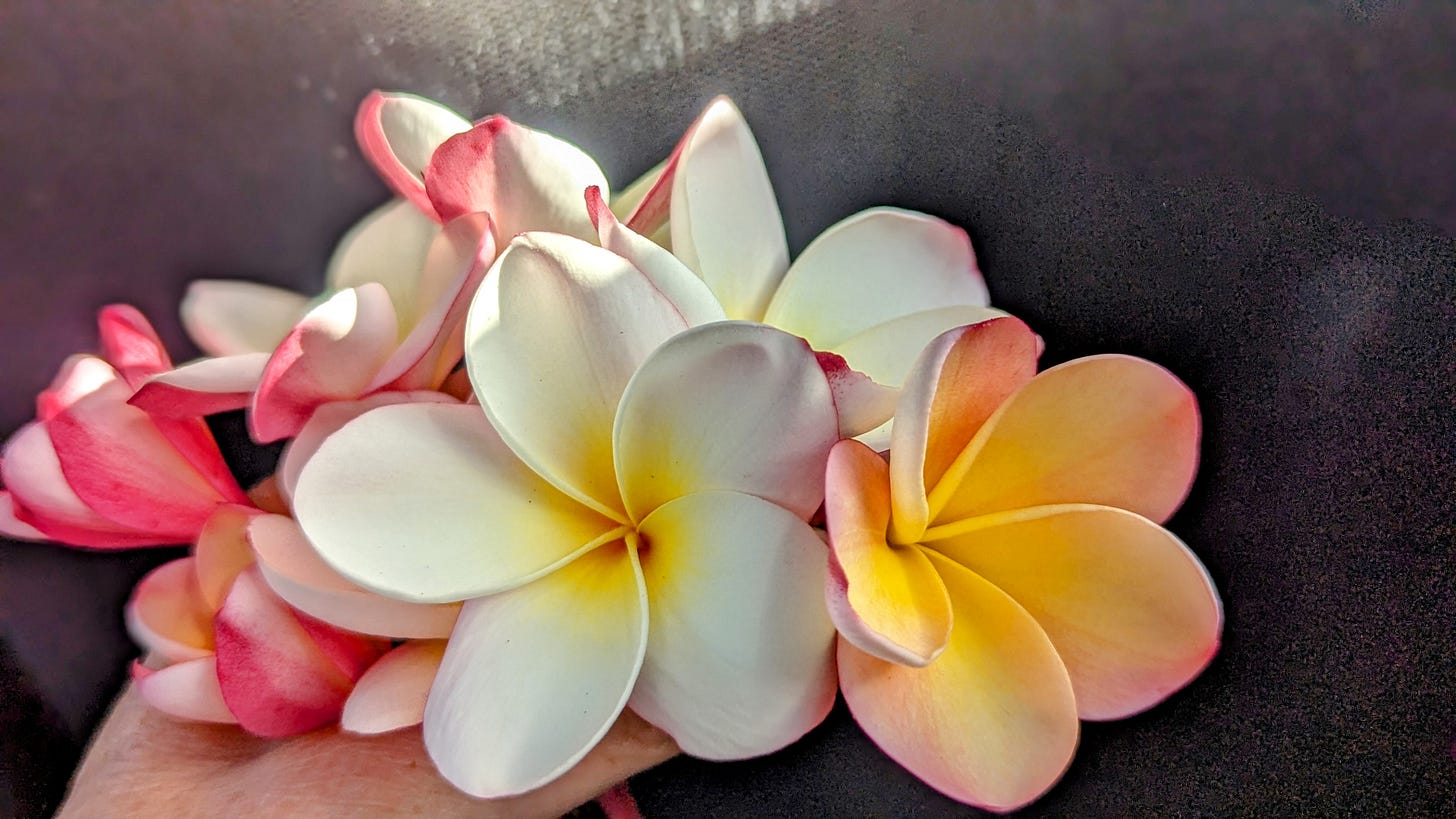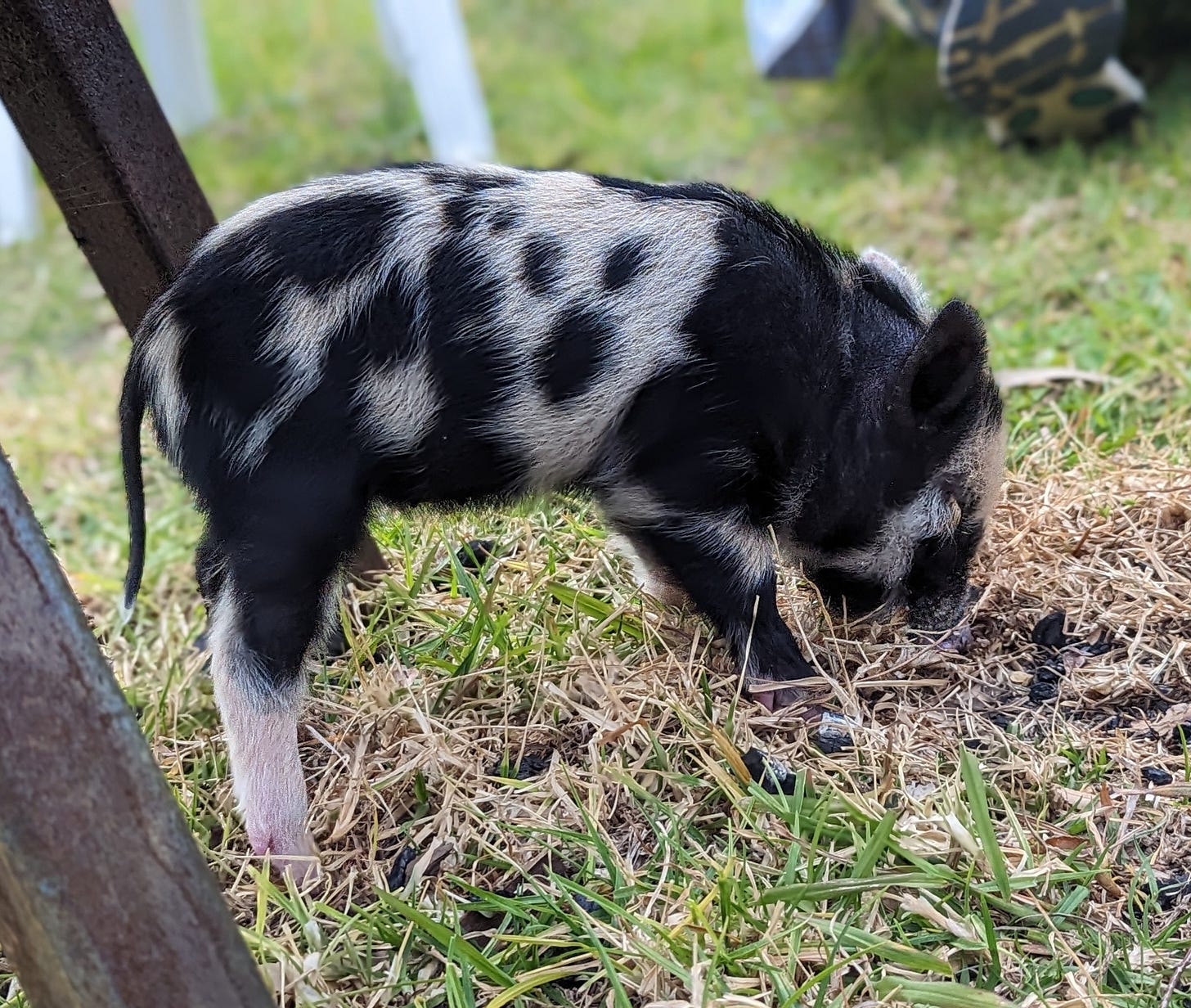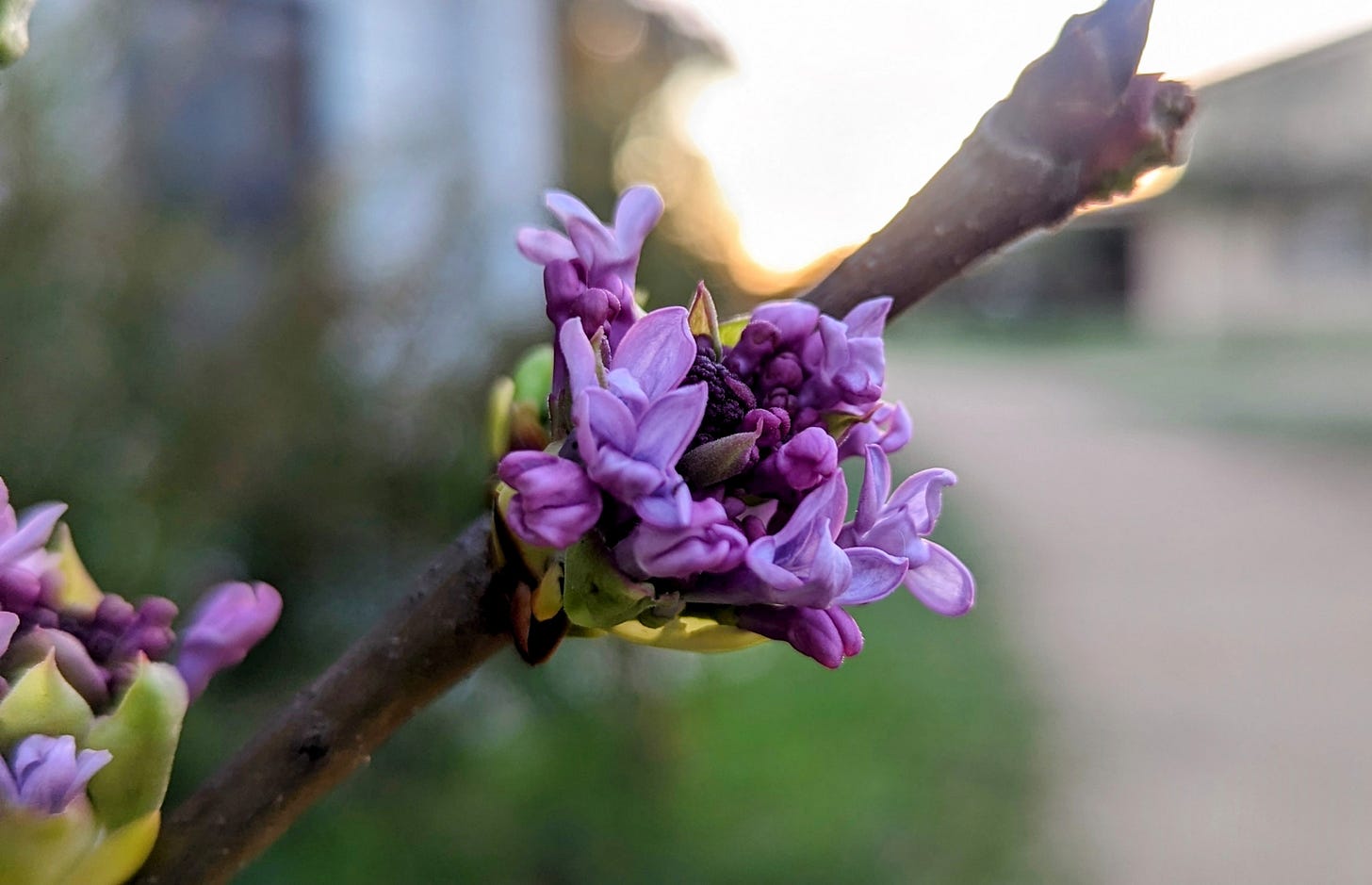Welcome back readers, and welcome, new readers –
This time we’re writing about the grandparents we gain not by being born but by happenstance: the one who notices the middle child of a big family who needs a special friend, the neighbor whose door is always open and who keeps a toybox and bookshelf ready for young visitors, the craftsman offering to pass on his skill. It’s impossible to place a value on the love of someone only related to you by a big heart and a welcoming spirit. They help lay a pattern for their adopted grandchildren, an example of how to live in a home with open doors, and how to grow old in the confidence of a greater adoption. These relationships can and do develop in all kinds of surprising ways, and community living provides many opportunities for them.
We’d love to hear about your adopted grandparents in the comments. Below are the stories of some of ours.
Trudi – in Spring Valley, southwest Pennsylvania
Grandparents hold our hands for just a little while, but our hearts forever.
-Terri Guillemets
Perhaps because my beloved grandparents passed away before I was even a sophomore in high school, I find those words beautifully true. For only the first ten years of my life did I actually live near any of my grandparents. All my memories of them are from the latter three or four years. But even that “little while” was a blessing. They are in my heart forever.
And so it is with other peoples’ grandparents—their memory stays with me too.
For my sisters and me, a good chunk of our childhood saw us attending a weekly Saturday 10:00 morning “snack time” at “Grandmother’s”. She was really the grandmother of one of my classmates, but we all called her "Grandmother”. I remember her warm smile. She was extremely soft-spoken and big-hearted and apparently didn’t mind having a whole collection of mothers and daughters in for a cup of tea and bread with homemade jelly or jam.
Grandmother also loved nasturtium flowers.
I remember Grandfather too. I can still see him resting on the sofa and opening his eyes and smiling when I came to play in a corner of their living room.
And that’s all. It seems strange that such small memories remain so strong, a glowing ember from childhood. Now, when I see bright yellow and orange nasturtiums, with their delicate, slender stems, I remember Grandmother’s equally bright smile and gentle soul. She couldn’t have known that her love would be like nourishment every time the memory was recalled.
And then there’s Oh Haraboeji, or in English, “Grandpa Oh”. He lives in South Korea, a beloved grandpa to all, related or not, in the small Yeongwol Bruderhof community that I was part of for two years. Grandpa Oh was not someone I talked much with, but I always greeted him in Korean and he always greeted me back in English. Here and there if I had an idea of a short conversation I might be able to have, (in Korean of course) I made a clumsy attempt. Understanding his Korean was challenging for me. I’m sure the challenge was mutual. Grandpa Oh celebrates his 89th birthday at the end of this month. (Korean age 90). He will celebrate with all of his adopted family. Read more about what Grandpa Oh means to me here: My German Opa and My Korean Haraboeji
Marianne – in Woodcrest, upstate New York
Our family is lucky to live on the same Bruderhof community with both Kent’s and my parents, and our children love seeing them almost every day, whether it’s to go to their home for a meal, learn to run an offset printing press, have a violin lesson, or be driven to soccer practice. That doesn’t mean that they don’t have many adopted grandparents as well. We can’t get to our house on the third floor without walking past the apartment of Oma Veronica, and for some of our children walking past it is difficult. There is often an extensive blanket fort in a corner, or a doll’s tea party in process, or a cookie-rolling project on the table (she bakes on a grand scale for a weekly farm stand), or simply story time on the couch (four of her own grand-daughters live next door). If you are five, or ten, or even fourteen and someone calls you “my darling” and offers you a fresh cookie when you pass their door, that person is one of your grandmothers.
What do they (and I) learn from Oma Veronica? Generous friendship, a door that is always open, laughter in the face of life’s challenges, care for all God’s children (the proceeds from the farm stand go the hungry people she knows about), and love that expresses itself in creative giving: a leather cover for a child’s first Bible, a beautifully decorated belt, innumerable cookie houses and Easter baskets, a homemade piñata for a party.
Before Oma Veronica moved into the downstairs apartment it was the home of George and Dorly. That spring and summer of 2018 their house was full of children – ours, their four grandchildren, other small neighbors – who were welcome to come and go, with or without their parents. There were games of Monopoly and roll ball with George, board and card games appropriate for the 5 and 6 year old crowd, and a fascinating doll house with minute china dishes that Dorly had grown up with. In one corner was a hand loom where she still taught children to weave. She was regal in her reclining chair, happily observing the children spread around the room and, with her years of experience as a kindergarten teacher, guiding imaginary play in exciting new directions, adjudicating squabbles, and telling stories of her own childhood in a little German village, living in the mill their family had run for centuries. Without ever moralizing, she too taught important lessons: fair play, honesty, creativity, how to be a good loser, and, as summer went on and her cancer progressed, courage. Our youngest daughter was born in May and was named in part for her (Dorly’s given name was Dorothea, my grandmother is Dorothy).
It is a wondrous thing to lay your newborn in the arms of someone whose days on Earth are mostly past. You see the knowing, happy glances pass between them, and realize how much lies beyond our field of vision. Hands rough with decades of work hold a hand whose fingers are just uncurling. Lullabies remembered from a distant childhood are sung into tiny ears. (When the boy next older than Dorothy was born we were neighbors to Grandma Pep, bed-bound from a stroke but incapacitated in body only. As the end of her life approached she was remembering more and more the son who had died as a child: “He was born on my Peter’s seventieth birthday,” she whispered to me when I brought the new little boy to lie next to her, a link in an unbroken chain of motherlove.)
Dorly died when our Dorothy was four months old, at home where we had visited her so often. We came to see her one last time the night she passed, standing around her bed to sing a song which we weren’t sure she could hear anymore. “Look, she is climbing Jacob’s ladder,” her daughter whispered to our children. They experienced her death – which we had told them was coming – as something that was both a holy mystery and completely natural, just like the birth of their sister.
Norann – in Danthonia, New South Wales, Australia
When Chris and I arrived in Australia in late 2002, we were in our mid-twenties and brought our two young sons to a very young Bruderhof community in a very rural location. There were fifty of us in the fledgling start-up, including many children, and most of us parents were young. There was one couple in their sixties on a visit of several months, but that was it, as far as grey hair went. For the first time, I realized how easily I’d taken for granted the unspoken stability and sense of completeness the “grandparent” demographic had provided at the larger Bruderhof communities I’d lived in, in New York and Pennsylvania.
So, from those first weeks onward, Chris and I set about adopting our own grandparents in the nearest towns of Inverell and Glen Innes.
Our first grandparents actually adopted us. Lawrence “Laurie” and Rosemary Breen had no children of their own, but were de facto parents and grandparents to all of Inverell, it seemed. They had taken in Chris’s parents – “We love taking in strays,” they told them! – when they first visited Australia for several months in 1999. Therefore, we were considered family even before we arrived.
Laurie took our boys to explore the river that ran through their acreage, baked them birthday cakes with generous layers of frosting, and allowed them to trash their house (all the toys out of the cupboard!) on rainy afternoons. When Laurie died suddenly of a heart attack, our boys become even more protective of their “Grandma Ro,” and her regular visits over Christmas and Easter and lots of times in between became part of our seasonal ebb and flow. Rosemary has decorated our Christmas tree with us every Christmas Eve for the last twenty years, and has walked arm in arm with our sons to contemplate the crosses our church puts up on Good Friday. Last year, she was present at the baptisms of our two oldest, and presented each of them each with cross necklaces that had belonged to Laurie. The same woman who arrived at the hospital minutes after our third son was born, bringing a six-pack of Guinness and a round of brie for me, and a blessing for him, often marvels out loud that the boys she once cradled are now men who lend her a steadying arm over the rough patches.
First together with her Laurie, and then as one of the bravest, least self-pitying widows I know, Rosemary has taught our family the boundlessness of a generous spirit motivated by love. Much as we feel she is “our” grandma, we know our family isn’t exceptional: we are among dozens, perhaps hundreds, of people – many of whom we’ve met on her porch or around her table – who feel about her exactly as we do. Because that’s how Rosemary makes people feel.
Laurie and Rosemary were just the beginning.
Bill and Denise “Sally” Byrne, our Glen Innes grandparents, were in their late sixties when we met them, and, since they had no grandchildren, they adopted our three sons as their own. Over the years there was a steady flow of birthday cards, and Sunday afternoon dinners at their home or ours. The boys loved watching test cricket on TV with Bill, and more or less tolerated Denise’s favorite DVDs of André Rieu’s musical extravaganzas. Best of all was hearing stories from their childhood and youth – Denise as a nurse, Bill as a career soldier, outdoorsman, and hunter.
Denise died when our sons were in primary school, and her farewell was one of the first funerals they attended. Our family sang “Morning has Broken” for Denise’s life celebration, and then continued to visit Bill as he adjusted to life without his beloved bride and his own declining health.
At Bill’s funeral just last year I gave the eulogy and our son, Jordan, sang an original song he wrote after the death of his own grandfather, Jerry. After the funeral I noticed that our sons’ carefully crayoned pictures of horses, sunsets, and scribbles still hang on the walls in the family home where they were first placed almost two decades ago. The paper has yellowed and the edges are frayed, but they capture the love of three “grandsons” for their “grandparents” that has stayed constant from childhood to manhood.
Betty O’Neill and Bob Buxton were the Inverell equivalent of Bill and Denise – same vintage but with a strong connection to the land and farm. From Betty I learned how to roast pumpkin, make goat’s cheese, and stay cool on a hot December day. Bob rolled his own cigarettes, told drought and flood and fire stories, and appreciated getting his hair cut by Chris on the old homestead porch. Our sons learned how to speak up and modify their American accents (Bob was hard of hearing), and stayed warm through the winters in Betty’s exquisite handmade, cable-knit sweaters. Betty and Bob gave our family a window into the hardscrabble life on Australian homesteads following World War II, and gave our sons wordless lessons in counting blessings, not sorrows.
Paul and Di Alliston, both much-loved members of Inverell’s education community, initiated a friendship as soon as we arrived. After his retirement, Paul became an occasional guest lecture at our community high school, bringing his passion for ancient history and Shakespeare. As our sons hit their teens, he became a mentor – encouraging them in their studies and offering them fresh perspectives on gap years, university degrees, and pathways to service. Di offered her educational wisdom and resources to our community teachers, and offered me steady support through all the parenting stages.
Greg and Deb Kachel, also pillars of our town, sensed a grandparental void in our lives and stepped in without hesitation to fulfill that role. It’s one they cherish and continue to this day. Their unfailing interest, positive presence, and encouraging influence is a guiding force in our sons’ lives and one that we will cherish forever.
In each connection it isn’t just the relationship of these legends to our sons, it is their sustaining friendship to us as well – helping us claim this country as our own, build connections in the community, and ensure that the next generation is going to thrive. It’s what our grandparents did for us, they tell us. Twenty-one years ago these people were strangers. Perhaps that they were once strangers, and that happenstance or God-incidence caused our lives to intertwine, strengthens the bond. Looking back, Chris and I cannot imagine raising our sons without the ongoing wisdom, friendship, and guidance of these adopted grandparents.
Jordan writes, “The connection between a child and their grandparents is a very special bond, and one that I believe plays an important role in a child's growth and development. Growing up away from extended family, we sought this relationship among our elderly neighbours, and soon shared in each other's lives like we had always known one another. When it came time to say goodbye, it was like saying goodbye to family.”
Jordan writes, “The connection between a child and their grandparents is a very special bond, and one that I believe plays an important role in a child's growth and development. Growing up away from extended family, we sought this relationship among our elderly neighbours, and soon shared in each other's lives like we had always known one another. When it came time to say goodbye, it was like saying goodbye to family.”
What we’re enjoying
Trudi
Is enjoying a field trip with her kindergarten class…
Marianne
Several times I’ve signed up for a “poem a day” mailing list, and I’ve always unsubscribed after a week or so because the selection was uninspired. Enter Poems Ancient and Modern, a substack edited by two poets, Joseph Bottum and Sally Thomas (who is also a novelist, I highly recommend Works of Mercy). Each day’s poem is introduced with notes on the context it was written in and its form. The selection is wonderful: some familiar favorites, some surprises, and something to learn about every poem. This would be an excellent resource for anyone who teaches literature, or for anyone who, like me, would like a reason to take a few minutes every day to read a poem (if you need to be inspired to do the same, read this lovely essay by Jane Clark Scharl “Poetry at Home”).
Norann
We’re in the last month of Autumn here in Australia (our seasons calendar runs in three month units (Autumn: March – May, Winter: June – August, Spring: September – November, Summer: December – February.)
So I’m enjoying the amazing colors:
Lantern walks with the children:
The last of the frangipani (my favorite summer flower and scent):
The first of the Granny Smith apples from our orchard:
Learning from my Year 11 son, Derek, how to care for bees:
Watching Rebel’s piglets grow up:
And remembering how she looked this week last year.
I love how her “Panda Face” marking (or what do you think it looks like?) still remains so clearly on her side:
And, finally, feeling my FIL Jerry’s presence (he died in November 2021) when the Red Buds he planted in New York and the lilac bushes he planted in New South Wales bloom two seasons and 10,000 miles apart in the same week:
That’s all for now folks. Enjoy the season you’re in!


















Thank you, Norann, for sharing your son's song. The heart of the matter...
I'm among the very fortunate people to meet Oma Veronica at the farm stand. She makes sure I leave with fresh produce and always asks me what I need. I tell her I have everything I need, including her!